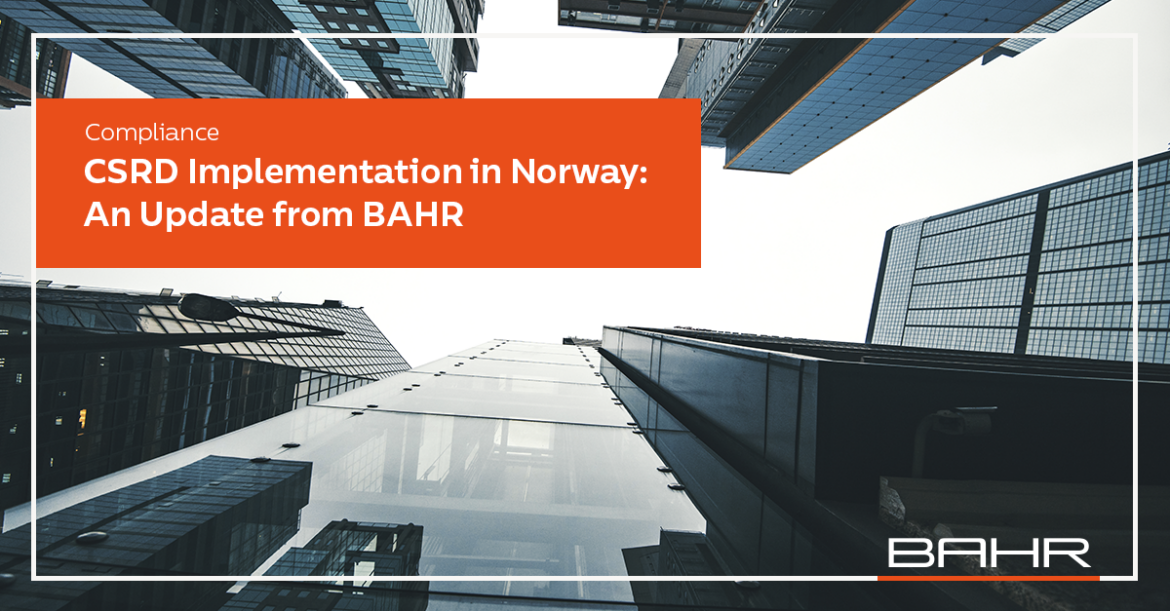Compliance | CSRD Implementation in Norway: An Update from BAHR

Norwegian CSRD Implementation: The Current Landscape
On March 15, the Norwegian Ministry of Finance published a legislative proposal (Prop. 57 L (2023-2024)) for the implementation of the CSRD (Directive (EU) 2022/2464). This comprehensive proposal signals that in-scope Norwegian enterprises will soon be required to provide a sustainability report audited according to European standards.
The proposal amends the current obligation to publish a sustainability report as part of the annual reporting applicable to enterprises meeting the conditions to be considered “large” enterprises” (e.g. listed companies or entities meeting threshold values for balance sheet total or number of employees). The definition of “large enterprises” is also proposed to be amended with the implementation of CSRD.
Norway’s commitment to align with the EU’s CSRD implementation timeline is clear, and we anticipate the Norwegian Parliament’s decision on this matter within the coming months.
Key proposed amendments to the current reporting obligations are:
- The required level of detail and accuracy for the reporting is comprehensive compared to the existing reporting requirements. It will also be required to link sustainability considerations to financial aspects of the business operations and report on the sustainability matters’ impact on the enterprise’s financial development, performance and position.
- The new sustainability reporting rules will replace the current sustainability reporting requirements in section 3-3 c of the Accounting Act. The high-level requirements set out in the act will work in conjunction with and be supplemented by detailed provisions set out in the European Sustainability Reporting Standards (ESRS), which, once established by the EU Commission, will be adopted as regulations in Norway. The general standards have already taken effect, and we expect the introduction of sector-specific standards to follow shortly. As an example, the act sets out that the sustainability report shall include whether the enterprises have time-bound targets for absolute emission reduction targets for 2030 and 2050, the progress made and whether these targets are based on scientific evidence. How this should be reported more specifically will be outlined in the ESRS.
- The enterprise shall assess and report on its impact on defined sustainability matters: environmental, social and governance aspects, including working rights and employee matters, human rights, and anti-corruption and bribery. The reporting shall be risk-based, which requires the enterprises to conduct initial assessments to identify sustainability matters and issues that they have a material impact on or that materially impacts them. The enterprises should then concentrate their reporting efforts on these identified areas of significance.
- The updated proposal suggests that around 1,100 Norwegian businesses will be subjected to the new sustainability reporting obligations, which is fewer than the 2,100 companies initially projected by the Securities Act Committee in NOU 2023:15.
- The Ministry proposes that the sustainability reporting requirements shall be legally established for all enterprise forms covered by the CSRD, including state-owned enterprises. Listed Norwegian companies will be subject to sustainability reporting regardless of their enterprise form.
- A regulatory provision has been proposed to potentially broaden the scope to include other entities subject to accounting obligations not already covered by the legislative proposal.
- The Ministry decided not to follow the Securities Act Committee’s suggestion in NOU 2023:15 to allow alternative assurance certification service providers, such as non-authorized auditors, to assurance certify sustainability reports. However, they have left open the possibility of permitting such certifications through future regulatory adjustments.
The Importance of Preparation: To succeed with the transition to the sustainability reporting format it is important to be proactive and prepare for the new detailed requirements. The CSRD will be gradually implemented in Norway with the same time schedule as in the EU, starting with the large, listed enterprises and financial institutions exceeding certain threshold values. The expectation is that this first group of entities will have to publish their new sustainability report in their annual report for 2024 in the spring 2025. Therefore, it is crucial to start laying the groundwork now. Once reporting requirements are integrated into Norwegian law, compliance will be essential, and the board of directors will bear the responsibility for adherence.
When the Parliament finalizes the legislative enactment, we will delve into the specifics of the new Norwegian rules. Our aim is to provide clarity on how these rules will affect your business operations and highlight any deviations from the EU’s CSRD.
Should you have any questions or require assistance in preparing for these changes, please do not hesitate to contact us. Our team is ready to offer strategic advice and support to ensure your company navigates this transition smoothly.
Stay tuned for more detailed updates following the final legislative decision. In case you missed it, our previous newsletter also provides insightful details on this subject.
Questions? Do not hesitate to reach out to our Compliance & Risk Management team.
